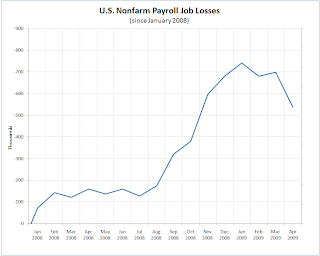
The pace of job losses in is slowing. This is apparent looking at the 16-month payroll chart for the United States, which shows that although the economy lost jobs for the fifteenth straight month, the pace of those losses is up off it's lows. The picture in Canada is similar, although the data is reported slightly differently. There will probably be at least another 3-4 months of negative job growth but there are other signs of "green shoots". That being said much of the appreciation in equity values that we have seen this past month is due to inflation as I mentioned in the previous post. The same is true for commodity prices, which are also up sharply off their lows earlier in the year. This trend is likely to continue, and without cheap oil, the extent to which the United States economy can recover is really quite dim. While the emerging economies still have a long way to go in terms of manufacturing quality, the productive capacity and thus growth potential of these regions far exceeds that of the 'developed' nations and at a much lower labour cost.
One of the biggest delusions I've heard is that the health services sector (drug research, health care, stem cell research, and so on) will lead us out of recession. While it's true that everyone is willing to pay more for their health, the reality is that they can still only pay what they can afford. The aforementioned speculation seems to be largely based on the premise that people will pay anything for good medical treatment when practical realities dictate otherwise. Further to this, the government will need to spend less, not more, on health care costs. Even with the health care sector outperforming other sectors, it alone cannot single-handedly sustain any economy of scale.
"Well, first of all, it's our money. We paid the taxes. We're just asking for some of our money back." - Buzz Hargrove, former Canadian Auto Workers Union president on why the union should be bailed out (April 26, 2009)
The attitude of Buzz Hargrove and thousands others needs to change. Hargrove did not finish high school and yet he feels that compared to international workers, he is entitled to better pay for equal work, simply because he was born in Canada. This is an indication, unfortunately, that the 'correction' is not quite finished yet, and we'll need to see a subsidence of the corporate welfare state, reduction in entitlement expectations and a notable improvement in workforce value generation. This means better service and quality for globally competitive prices. This is where America has diverged so far away from it's founding principles in recent years. In a free economy, jobs can, and should be outsourced unless the domestic workforce provides greater competitive value. Not only is this a critical component of a free economy, but it is also critical in a free society and any protectionist government measures to artificially maintain jobs domestically will only hurt the economy in the long term. There are no shortcuts on the road back to prosperity.
.jpg)
1 comment:
I agree with most of what you said but the government’s responsibility is to its citizens and to that end it must do what is necessary to protect them. It is debatably what exactly that action should be but in my opinion a happy balance has to be struck between a total liaise faire approach and socialism.
Some jobs need to be protected, some industries need to be protected otherwise it could lead to the ruin of the local economy to the betterment of the global one. Private business left to their own devices will do what is in their own best interest and the interest of their shareholders. Now it is possible that those interest may be benevolent but when they are not and when they are destructive to the greater good that is where/when the government needs to provide direction.
Post a Comment